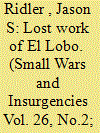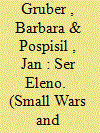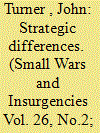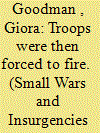|
|
|
Sort Order |
|
|
|
Items / Page
|
|
|
|
|
|
|
| Srl | Item |
| 1 |
ID:
139108


|
|
|
|
|
| Summary/Abstract |
Charles Ted Rutledge Bohannan (1914–1982) became an integral agent of US counterinsurgency operations during the early Cold War, contributing to both the success of the COIN effort to defeat the communist Huk insurgents in the Philippines and the stalled COIN efforts in Vietnam. In the early 1960s, he wrote a short and compact analysis of the US and Filipino experience of guerrilla warfare, from the Philippine–American war until the defeat of the Huk Rebellion. It was never published. Reprinted here, Bohannan's analysis of lessons learned makes a substantial contribution to the history of American ideas of unconventional warfare by an expert who contributed these lessons to the successful defeat of an insurgency in South East Asia.
|
|
|
|
|
|
|
|
|
|
|
|
|
|
|
|
| 2 |
ID:
139105


|
|
|
|
|
| Summary/Abstract |
In conflict studies, identity has been posited as an explanatory factor of the resilience of insurgencies. This article focuses on the identity formation of the National Liberation Army (ELN), a leftist insurgency group in Colombia. As a Marxist–Leninist organisation, the ELN aims to overcome capitalism. In their perception, this is possible via the transformation of the individual into a ‘collective personality’. Along the dimensions of ‘content’ and ‘contestation’, we will demonstrate the mechanisms they impose for such identity formation. Identity, as we will argue, is a main factor in explaining why people participate in this insurgency and thereby enhance its resilience.
|
|
|
|
|
|
|
|
|
|
|
|
|
|
|
|
| 3 |
ID:
139104


|
|
|
|
|
| Summary/Abstract |
As part of the next phase of the Global Jihad, al Qaeda has been committed to winning popular support among Muslims. Ayman al-Zawahiri and the al Qaeda inner circle recognise that a global terror movement and civil conflicts in the Middle East, brought about by the Arab revolutions, necessitate different operational methods. As such, they have disavowed the Islamic State of Iraq and al-Sham for their insubordination and unconstrained tactics, a move that has implications for the Middle East, international relations, the legitimacy of the al Qaeda leadership, and the future of the Global Jihad.
|
|
|
|
|
|
|
|
|
|
|
|
|
|
|
|
| 4 |
ID:
139106


|
|
|
|
|
| Summary/Abstract |
In 1999, rebels rose to oppose the newly elected former warlord Charles Taylor in Liberia. Motivated by a variety of reasons, the minimal common denominator of these rebels, who assumed the name Liberians United for Reconciliation and Democracy (LURD), was that Charles Taylor must leave the country. The decentralized nature of LURD though stands out in their struggle, as they don't fit the unitary actor assumed by literature on strategy, nor the alternative conception of decentralized forces fighting for purely local reasons. Understanding such aberrations as LURD is the first step to finding strategies that can incorporate and manage them.
|
|
|
|
|
|
|
|
|
|
|
|
|
|
|
|
| 5 |
ID:
139109


|
|
|
|
|
| Summary/Abstract |
This essay explores how federalized Texas Rangers, in the form of scout companies and larger mounted rifle regiments, provided controversial, and ultimately cost-effective, versatility to the US Army during its campaign in Northern Mexico between 1846 and 1848. It argues that their contributions centered on three tactical tasks that enhanced the invading army's maneuvers: reconnaissance, direct assault, and counterguerrilla patrolling. Each of these actions reflected a distinctive skill-set at which the auxiliaries excelled, marking them as exceptionally multifunctional assets. The Texans' augmentation coincided with, and was necessitated by, the evolving stages of the war in Northern Mexico, beginning with the American army's initial invasion, then transitioning to the assault on Monterrey, and finally ending with a troubled occupation where the rangers' brutality both enabled and undermined American pacification efforts.
|
|
|
|
|
|
|
|
|
|
|
|
|
|
|
|
| 6 |
ID:
139107


|
|
|
|
|
| Summary/Abstract |
In November 1945, British army shooting during street riots and search operations in Palestine resulted in the death of 13 Jews and the injuring of dozens. The most costly in casualties caused by army fire during the whole Jewish insurgency, these incidents have nevertheless not received detailed attention in literature on the British army's counterinsurgency campaign in postwar Palestine. This article outlines British military use of firepower to control civilian crowds and the difficulties involved during these incidents, contributing to the debate on the army's principal of ‘minimum force’. It also highlights the serious problem of legitimizing opening of fire on unarmed protestors, epitomized in the army's fabricated account justifying shooting at a large crowd rushing a military cordon at Givat Hayim.
|
|
|
|
|
|
|
|
|
|
|
|
|
|
|
|
|
|
|
|
|